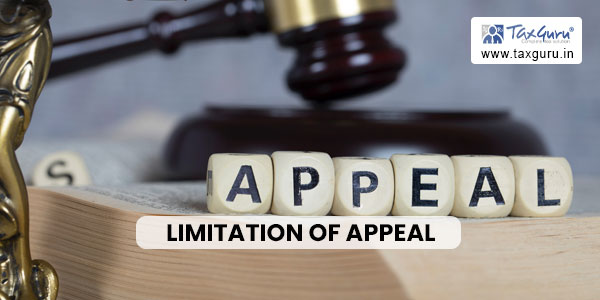Department cannot file appeal on a ground not existing in Show Cause Notice – Limitation of appeal under Section 107(2) of GST Act
In the complex landscape of GST adjudication, appeals play a pivotal role for both the assessee and the revenue department. Section 107(1) of the GST Act permits the assessee to file an appeal if aggrieved by an order, while Section 107(2) extends the same privilege to the revenue department. However, the scope of departmental appeals under Section 107(2) is not unrestricted. This piece aims to shed light on the limitations of departmental appeals as outlined in this section.
Any adjudication order passed under GST has effects to both the assessee as well as revenue department. If assessee is aggrieved by the order, he has the remedy of filing the appeal under Section 107(1). If the revenue is aggrieved by the order, even they have the option of filing appeal under Section 107(2). In this article an attempt is made to highlight the limitation on scope of departmental appeal under Section 107(2).

Section 107(2) empowers the Commissioner to call for and examine the record of any proceedings in which an adjudicating authority has passed any decision, for the purpose of satisfying himself as to the legality or propriety of the said decision or order. Further, the Section also empowers him to direct, by order (which is generally called Review Cum Authorization Order), any of his subordinate officers to apply to the Appellate authority for determination of such points arising out of the said decision or order as the Commissioner specifies in his Review Cum Authorization Order. What is important to be noted here is that appeal can only filed for determination of SUCH POINTS ARISING OUT OF THE ORDER. If a point doesn’t arise out of the order, Section 107(2) doesn’t enable filing of appeal.
This leads us to an important question, ‘can a ground not invoked in SCN be raised in departmental appeal filed under Section 107(2)?’. It is obvious that if a point/ground was not raised in SCN, the order would not have considered such ground. When the order doesn’t consider a ground, such point/ground doesn’t arise out of that order. This can be understood with the help of an example – Lets assume that an SCN had proposed to levy 28% tax by treating something as gambling and later came to a conclusion that the service is not gambling and 28% tax is not leviable. In this case, ‘whether OIO was justified in not holding the activity as gambling and not confirming the tax at 28% rate?’ would arise out of the order. However, if the department wants to contest the same transaction as a supply of goods and wants to file an appeal for levying 28% tax and CESS in addition, same cannot be done under Section 107(2). This is for the reason that the order had not considered the ground of transaction being a supply of goods. Order had not considered and adjudged the levy of CESS. As such, the ground of transaction being a supply of goods and the issue of levying CESS doesn’t arise out of the order.
Supreme Court in the case of Seth Pushalal Mansinghka Private Limited vs CIT (1967) 3 SCR 961 has held as below
“But it is not possible for us to accept this argument in this case, because the appellant did not raise the question of apportionment of profits before the Appellate Tribunal, nor was it considered and decided by it. In CIT v. Scindia Steam Navigation Co. Ltd. [42 ITR 589] it was pointed out by this Court that when a question of law is neither raised before the Tribunal nor considered by it, it will not be a question arising out of the order of the Tribunal and the High Court will be acting beyond its jurisdiction in dealing with any such question.”
In the case of T.D. Kumar and Bros. (P) Ltd. v. CIT, (1967) 63 ITR 67 the Supreme Court held as below
“6. Again it is clear that the question whether having regard to the decision of the Tribunal in the assessment proceedings an order imposing penalty under Section 28(1)(c) of the Act could be made was never raised or argued before the Tribunal and the Tribunal did not decide that question. The only contention raised before the Tribunal was that the transaction of sale and purchase in the shares of the Trust being genuine, no case under Section 28(1)(c) of the Indian Income Tax Act was made out. This Court has in Scindia Steam Navigation Company case [1961 42 ITR 589 : 1962 1 SCR 788] held that “it is only a question that has been raised before or decided by the Tribunal that could be held to arise out of its order”. In respect of the question which was not raised before the Tribunal, argued or decided by the Tribunal, a reference under Section 66(2) of the Indian Income Tax Act could not be asked for.”
Delhi High Court in the case of Dalip Singh vs Union of India 1987 (31) ELT 352 (Del) has held as below
“These submissions were admittedly not made on behalf of the petitioner in either of the two appeals before the Tribunal and the Tribunal had no occasion to deal with them and has not referred to any such submission in its appellate order. That being so, this question does not arise out of the order of the Tribunal and hence there can be no question of the Tribunal being directed to refer any such question.”
Honourable CEGAT in the case of CCE, Ahmadabad vs Cellulose Products of India 2000 (124) ELT 1133 (Tribunal) has considered a case wherein authorisation was given by Commissioner to file appeal on a point which was not mentioned in the SCN or adjudication order. The CEGAT has held that the authorisation to file appeal could not have been given by Commissioner on any ground which was not taken in SCN or considered in adjudication order since such ground did not arise out that order. Similar judgements were passed in the case of Raman Mangal Patel vs CC 1988 (33) ELT 176 (Tribunal).
Conclusion: In conclusion, while Section 107(2) of the GST Act provides the revenue department with the opportunity to contest adjudication orders, it clearly defines the scope of such appeals. Grounds not invoked in the SCN cannot be introduced in departmental appeals under this section. If an authorization is given to file appeal on grounds not existing in SCN then such authorization itself would become void. The appeal filed on such ground also would face the same fate.
This limitation ensures that the appeal process remains rooted in the original proceedings and the issues discussed therein, fostering a sense of fairness and adherence to due process. As this area of GST law continues to evolve, it is crucial for stakeholders to remain informed and vigilant of their rights and limitations within the appeal process.
Any critical views or additional points are most welcome.





